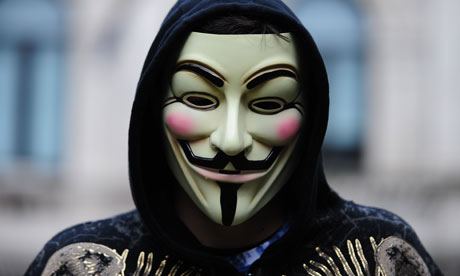Chris McSweeney looks at how terrorism has changed and polymorphed over the past 400 years and what it has come to mean in the modern day.
Guy Fawkes – the only man to ever enter Parliament with honest intentions, or so the saying goes. It is common knowledge, that every year on November 5th, we celebrate the anniversary of the 1605 Gunpowder plot ÔÇô in which Guy Fawkes and his co-conspirators (including mastermind Robert ÔÇ£WhereÔÇÖs my nursery rhyme?ÔÇØ Catesby) attempted to destroy the Houses of Parliament with 36 barrels of dynamite hidden in a cellar beneath the chambers. Further atrocities were attempted centuries later in the very same cellar by Edwina Currie and John Major.
Today, we celebrate FawkesÔÇÖ treason against the Crown with ironic enthusiasm. Not only on November 5th ÔÇô in which firework displays are a staple of modern British culture, and a fork in the groin of A+E departments nationwide that same night, but the legend of Fawkes, Catesby and the less famous conspirators has penetrated into pop culture ÔÇô most recently with Alan MooreÔÇÖs graphic novel ÔÇ£V for VendettaÔÇØ, and its subsequent film adaptation by the Wachowski Brothers. ThereÔÇÖs an undeniable, anarchic appeal of a lone freedom fighter ÔÇô blowing away the corrupt, oppressive bureaucracy of Government and wiping the slate clean, starting it all from scratch.
However, itÔÇÖs very often overlooked that while the Gunpowder plotters were attempting to remove the totalitarian, pro-protestant rule of James I, it was only to install a totalitarian pro-Catholic theocracy of their own. This was one of the earliest recorded acts of what today, we would call terrorism.
Terrorism is a morally despicable and questionably effective means of political violence ÔÇô by definition it is a systematic use of terror, often violent, as a means of coercion. It also almost never, ever, works to desired effect. Usually because retaliation against the original cause is too strong, or the use of senseless violence on the part of the perpetrators themselves alienates them from the people they are supposedly fighting for. But then again, how would we label the French Resistance in World War 2, or most profoundly, the victorious Afghan insurgents who drove out the Soviet occupation in 1988, but then would later become our sworn enemies following the NATO invasion in 2001? ItÔÇÖd seem history is written by the victors. But I digress.
In contemporary Western society, it is most often associated with Al Qaeda and Islamic Fundamentalism. However, throughout the 20th Century – the bloodiest century in human history – terrorism was a frequently utilised tool for political gain, by both paramilitary groups, as well as, very often unbeknown to their people, governments.
The Provisional IRA was the most significant threat terrorist to the United Kingdom until the end of its campaign in 1997. ItÔÇÖs declared aim was to free Northern Ireland from British rule, and unite mainland Ireland as a socialist republic ÔÇô a noble cause (depending on your opinion of the continued existence of the United Kingdom of Great Britain and Northern Ireland as a nation state). However, itÔÇÖs bombing campaign throughout England claimed the lives of over 1300 people between 1969 and 1980. As well as British Army personnel, 600 were civilians.
However, Terrorism is not just a tool of desperate fringe paramilitary groups ÔÇô Governments have, in the past, done the unthinkable and used terrorism as a means of political persuasion against their own people. Most famously, although still an event open to debate, the Reichstag fire of 1933 was rumoured to have been orchestrated by the Nazis to gain the full support of the German people. In the press, they openly accused the German Communist party, and just about all other dissenting political rivals. This was a profound catalyst to the NazisÔÇÖ electoral success, as Hitler was elected Chancellor later that year. This has since been described as a ÔÇ£false flagÔÇØ operation – an operation carried out by Governments, designed to look like a terrorist attack to raise public support for a potentially unpopular cause. You might see where IÔÇÖm going with this.
I am not a conspiracy theorist. I have no time at all for ÔÇ£controlled demolitionsÔÇØ or ÔÇ£second gunmenÔÇØ, because very often the closer you look at these so-called studies, you come to realise that the ÔÇ£factsÔÇØ that are presented are little more than a collection of distortions, half-truths, and tenuous connections which make sense only with the benefit of hindsight. IÔÇÖm talking of course about the ever-popular 9/11 Conspiracy Theories.
Films such as ÔÇ£Loose ChangeÔÇØ go in to great depth and detail in weedling out any potential anomalies which bring doubt into official reports as to what happened on September 11th, and the subsequent foreign policy of the Bush Government. The overall thesis is, that Bush and co, with the help of the CIA planned 9/11 themselves, and carried it out to justify a war in Iraq. This is explained by conspiracy theorists with a myriad of testimonies from crazy people (some actually claim mind control was being used), genuine quotes out taken of context, and frame-by-frame analysis of video footage from the day (which reveals nothing). The fact that many people have even been driven to protest by this alleged treason (even Charlie Sheen publicly asked Obama to tell everyone ÔÇ£what really happenedÔÇØ) is offensive to the victimsÔÇÖ families, and itÔÇÖs selfish on the part of the conspiracy theorists themselves. TheyÔÇÖre so desperate to simplify an overwhelmingly complicated issue into an episode of 24 with a three act structure, that theyÔÇÖll completely disregard any opinion, no matter how factual, which disagrees. And how do they justify this? One of two answers ÔÇô for the average person; ÔÇ£You just donÔÇÖt know the truth, man.ÔÇØ And for the scientist or historian with the factual dissenting opinion; ÔÇ£YouÔÇÖre one of them.ÔÇØ
With regard to 9/11, many mistakes were made. Terrible mistakes which cost lives. In the decade following, as well, governments passed numerous laws which restricted our civil liberties ÔÇô the Patriot Act, mass surveillance in the UK ÔÇô all done in the name of protecting us. Nobody wins. Ultimately, one does wonder exactly what terrorists think theyÔÇÖre going to accomplish. Still, Remember remember and all that.





Add Comment